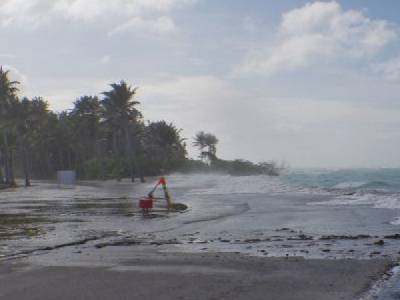
Posted on March 12, 2018
Understanding and predicting coastal flooding is a challenging and urgent problem in the presence of sea-level rise, a changing climate, and ever-growing coastal populations. Although this issue is global in scale, understanding and predicting flooding along tropical coral reef-lined shorelines presents unique challenges owing to the complexity of these shorelines which have been little studied and for which there is little data.
In February 2018 in Honolulu, Hawaii, a group of about 30 experts were brought together from around the globe to foster collaboration and assess the state of knowledge of the different factors that control the spatial extent, timing, frequency, and magnitude of coastal flooding along tropical coral reef-lined coasts. During three days of presentations and discussions, they identified opportunities and challenges related to the production of information for flood early warning in support of disaster risk reduction as well as flood scenarios in support of climate vulnerability assessment and adaptation planning.
Among key outcomes is the development of a framework for coastal flood warning and scenario product development that identifies information that already exists and how it can be used to generate products that can be used now to provide actionable information. Gaps in knowledge that can be bridged over the near term or need to be bridged over the longer term in order to develop and deliver more accurate, timely and locally relevant coastal flood warning and scenario products were also identified. Ultimately, recognizing that there is much to do and that resources are limited, this group of experts agreed to form a consortium of expertise that will begin to meet regularly and lay out a pathway towards the development and delivery of a broad spectrum of coastal flood-related decision support products and tools for tropical coral reef-lined shorelines.
The ‘Understanding Flooding on Reef-lined Island Coasts’ Workshop was supported by USGS and NOAA and run in collaboration with Deltares and CSIRO. All presentations are available online.
Source: Deltares





